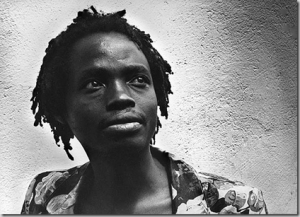Today we remember the extraordinary and explosive life of Dambudzo Marechera, the Zimbabwean ‘enfant terrible of African literature’ who on this day in 1987 died homeless, penniless and sick from AIDS on the streets of Harare at the age of thirty-five. Tragically for Marechera, even the greatest genius cannot flourish if through the misfortune of their awful circumstances they have become sociopathically programmed to deride contemporaries, to show absolute nihilistic contempt for academic and literary institutions and, at all opportunities, to bite the hands that attempt to feed them. Unfortunately, as the culture of Marechera’s war-torn birthplace had for the previous century been systematically used, abused and ultimately destroyed by White rule, such a brutal finale appears to have been the destiny of this perplexing figure – this simultaneously sensitive and insensitive Poet Brute whose task was always to question, provoke and even endanger all kinds of authority figures whom he would encounter in his too brief life.
Deadly aware of his ‘problem child’ reputation, Dambudzo blamed his mother for ‘cursing’ him with a first name that had traditionally been given to girls, and which means in his own Shona language ‘the one who brings trouble’. Little wonder then that this brilliant outsider would grow up seething with resentment. Born into extreme poverty, in 1952, Marechera as a young boy found his escape from his violent surroundings through reading, after obtaining his first book – a Victorian children’s encyclopaedia – from a rubbish dump. His homeland was at that time still named Rhodesia after the dreadful Victorian adventurer, Cecil Rhodes, whose gold and diamond mines had turned most of the population of former Matabeleland into his private slaves. Now still governed by the racist white minority under Prime Minister Ian Smith, Rhodesia was by 1965 boiling over with bile and antipathy, and Marechera was forced to enter his teenage years in a country mired in civil war – one that would not conclude until the creation of the Republic of Zimbabwe in 1979. His country’s instability, its permanent turmoil – these were the factors that most informed his art and his future lifestyle. And though Marechera’s singular if vexatious brilliance emerged soon afterwards, so too would the signs of an unstable personality that would persistently and ultimately sabotage his life.
Marechera won a scholarship to the University of Rhodesia but was expelled after his participation in campus riots in the summer of 1973. Shortly thereafter, he won a scholarship to Oxford University: a life-changing opportunity! Marechera, however, did not adapt well to British culture and in particular the rigid Oxford educational tradition. Alcoholism now fuelled his inherently rebellious nature; after numerous disruptions, his final act at Oxford was an attempt to set fire to the university’s New College. Given a choice between psychiatric treatment and expulsion, Marechera made his decision: “I got my things and left.”
Three years later, these six words would form the opening sentence of his extraordinary book, The House of Hunger – a collection of eight stories and two poems. After quitting Oxford, Marechera had chosen to live a shadowy existence in a tent by the River Isis in London where he wrote and drank. The House of Hunger was a semi-autobiographical account of violence, squalor, political upheaval, cultural and racial divides, and personal torment as viewed through the eyes of a Rimbaud-like boy-brat visionary – it found immediate acclaim, in 1979, going on to win the Guardian Prize for First Fiction. Marechera however rejected the plaudits in favour of self-sabotage: he arrived at the award ceremony wearing a flamboyant red poncho and proceeded to throw china, chairs and accusations of hypocrisy at his fellow participants. Marechera returned to the newly liberated Zimbabwe shortly after the publication of Black Sunlight, his surreal novel about revolution set in his nation’s violent landscape. But the author’s itinerant and recklessly provocative lifestyle continued in Harare, where his reputation, talent and future prospects were just not enough to prevent him from self-destructing. In the words of his biographer and champion, Flora Veit-Wild, Marechera’s “major quest in life and work was to fight any form of pretence, to unmask all forms of oppression of the individual’s freedom and rights.”
Dambudzo Marechera’s untimely vagabond death in no way reflects fairly the vivacious life of this extreme, almost heroically contrary figure. But it does aid Marechera’s legacy as his role as an African literary hero continues to gain momentum. In 2009, even stuffy Oxford University celebrated the life of their would-be arsonist!



Pingback: Zimbabwean writer Dambudzo Marechera Commemorated in New e-Book | Books LIVE
Pingback: Short Story #15. Oxford, Black Oxford (Dambuzdo Marechera) | Returning Reader